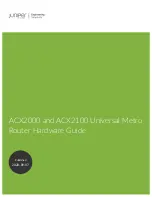
has only one transmitter and one receiver. Therefore, it is SISO (Single in Single out) in the 5-GHz band. The
MRC gain is important only for the 2.4-GHz radio in the 1552 access points. The MRC is not available for
the 5-GHz radio. The 2.4-GHz radio has one Tx and up to three Rx antennas depending on the AP configuration.
In the 1522 access points, users have an option to use one, two, or three 2.4-GHz Rx antennas. With this
option, users get around 3 dB MRC gain with 2 Rx antennas and a 4.5-dB MRC gain with 3 Rx antennas for
data rates of 24 Mbps or higher.
For the 1552 access points, both the 2.4- and 5-GHz radios are 2x3 MIMO. Therefore, they have two transmitters
and three receivers. Because the antennas are dual band and there is no option to have less than three Rx
antennas, the MRC is added to the RX sensitivity always as it is embedded into the baseband chipset.
The number for typical Rx sensitivity in our customer data sheet assume 3 Rx antennas for both the 1520 and
the 1550 series access points.
With the chipset used in the AP1520 series radios, there was a start-of-packet problem at lower data rates that
wiped out the gain. Therefore, the MRC gain became useful from a data rate of 12 Mbps onwards in the 1520
series access points. This problem has been corrected in the current chipset used in the 1552 access points.
The MRC gain has improved for lower data rates as well in the 1552 access points. You get a 4.7-dB
improvement in sensitivity with the 2x3 MIMO radio over a 1x1 SISO implementation.
Table 10: AP1552 11a/g MRC Gain, on page 36
and
Table 11: AP1552 11n MRC Gain, on page 36
list the
MRC gain for the AP1552 11a/g and AP1552 11n respectively.
Table 10: AP1552 11a/g MRC Gain
MRC Gain from 3 RXs (dB)
Modulation
11a/g MCS (Mbps)
4.7
BPSK 1/2
6
4.7
BPSK 3/4
9
4.7
QPSK 1/2
12
4.7
QPSK 3/4
18
4.7
16QAM 1/2
24
4.7
16QAM 3/4
36
4.7
64QAM 2/3
48
4.7
64QAM 3/4
54
Table 11: AP1552 11n MRC Gain
MRC Gain from 3 RXs (dB)
Modulation
11n MCS
No. of Spatial Streams
4.7
BPSK 1/2
MCS 0
1
4.7
QPSK 1/2
MCS 1
1
4.7
QPSK 3/4
MCS 2
1
Cisco Mesh Access Points, Design and Deployment Guide, Release 7.3
36
OL-27593-01
Mesh Network Components
Cisco Outdoor Mesh Access Points















































